#ICA Philadelphia
Explore tagged Tumblr posts
Text
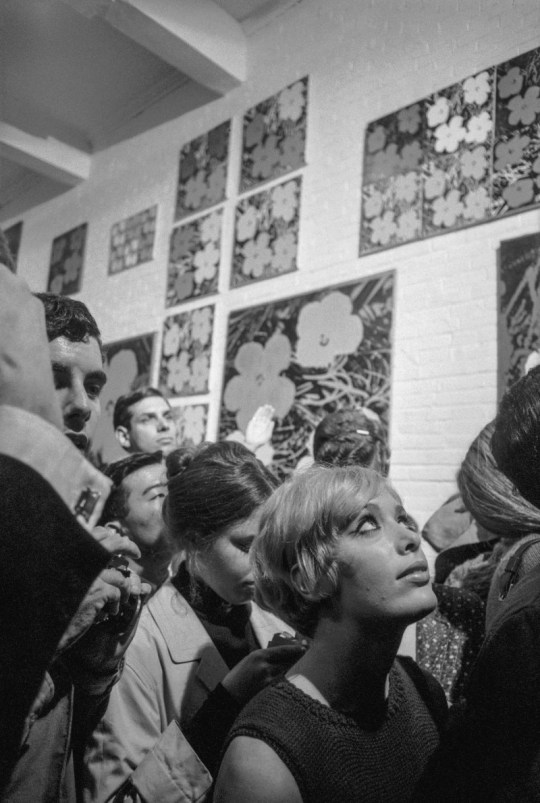
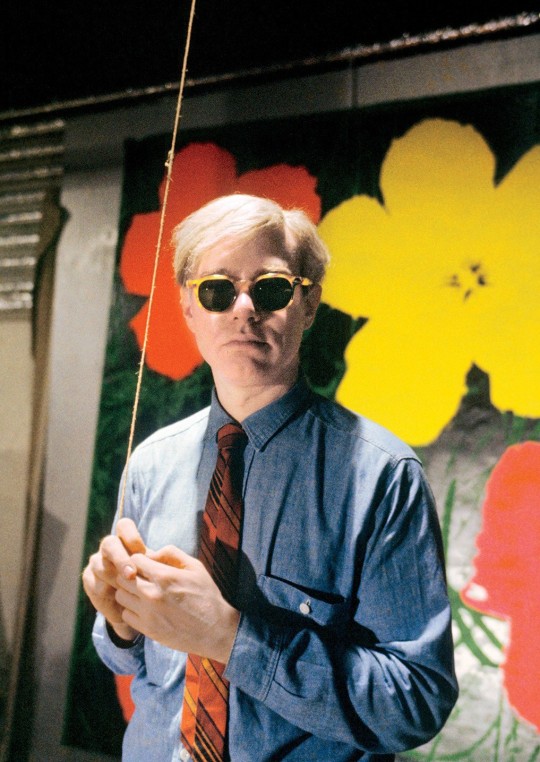
THE RISE OF ANDYMANIA -- CLASS OF '65.
PIC(S) INFO: Spotlight on the opening of Warhol's first museum show at the Institute of Contemporary Art in Philadelphia on October 8, 1965, and reportedly the moment that Warhol, and America, realized that Andymania might rival Beatlemania as a pop culture phenomenon. The ICA audience was more interested in him than in the Flowers and Green Stamps that covered the walls. 📸: Steve Schapiro.
PIC #2: Andy Warhol photographed at the 47th Street [Silver] Factory in front of "Flowers" silk screen prints, holding a light cord, NYC, c. 1964. 📸: Bob Adelman.
Sources: www.blind-magazine.com/stories/andys-pop-life & Vanity Fair Magazine.
#Andy Warhol Flowers 1964-1965#Andy Warhol#Andy Warhol Flowers 1964#Andy Warhol Flowers 1964-'65#1964#Warhol Flowers#Warhol#Paintings#Bob Adelman#Bob Adelman photography#60s#Sixties#Flowers Andy Warhol#Institute of Contemporary Art#Andy Warhol Flowers#Flowers Warhol#Andy Warhol Flowers 1965#1960s#60s Art#Steve Schapiro photography#Steve Schapiro#1965#Flower Paintings#NYC#Andy Warhol Flower Paintings
4 notes
·
View notes
Text
5 Music of Monday: Geordie Greep Unleashes "Blues" New Single
Geordie Greep of black midi drops his electrifying new single "Blues," blending rock and dance vibes with classic blues. Check out the vibrant live video from TV Eye in New York and don’t miss his upcoming tour dates to experience the magic live! Geordie Greep (of black midi) shares new single 'Blues’ from forthcoming album 'The New Sound' (out now) + share new live video filmed at TV Eye in New York a couple of weeks ago If you've ever wanted to know what a Blues song with singing and rich bass that are equally as fast sounds like and just so happen to be a Blues fan then you're probably going to like this track. Ironically also called Blues. I openly confess that even though I'm not much of a fan of Blues this rock/dance-esque sounding track gets my vote. Live Video of ‘Blues’ filmed at TV Eye https://youtu.be/gNGlbB4Gbyo New Single ‘Blues’ FORTHCOMING TOUR DATES - Fri-Oct-4 – London, ICA – SOLD OUT - Sat-Oct-5 - London, ICA – SOLD OUT - Sun-Oct-6- London, RT East, Instore – SOLD OUT - Thur-Oct-10 - Cardiff , Llais Festival @ WMC (w/ Squid) - Sat-Oct-19 – Budapest, Isolation Festival - Tue-Oct-22 - Bristol, Fleece - Wed-Oct-23 – Falmouth, The Cornish Bank - Fri-Oct-25 – Cambridge, Storey's Field Centre - Sat-Oct-26 – Liverpool, Arts Club - Sun-Oct-27 – Glasgow, Classic Grand - Mon-Oct-28 – Newcastle, The Cluny - Tue-Oct-29 – Leeds, Brudenell Social Club – SOLD OUT - Wed-Oct-30 – Nottingham, Rescue Rooms - Fri-Nov-01 – Brussels, Les Nuits Botanique Weekender @ Orangerie - Sat-Nov-09 - London, Pitchfork Festival @ EartH - Tue-Dec-03 – Paris, Point Ephemere - Thu-Dec-05 – Berlin, Lido - Fri-Dec-06 – Amsterdam, Bitterzoet – SOLD OUT - Sat-Dec-07 – Nijmegen, Doornroosje - Mon-Dec-09 – Milan, Magnolia - Tue-Dec-10 - Düdingen, Bad Bonn - Thu-Jan-16 - Philadelphia, PA Johnny Brenda's - Fri-Jan-17 - Philadelphia, PA Johnny Brenda's – SOLD OUT - Sat-Jan-18 - Baltimore, MD Ottobar - Sun-Jan-19 - Raleigh, NC Kings - Tue-Jan-21 - Asheville, NC Eulogy - Wed-Jan-22 - Atlanta, GA The Earl - Fri-Jan-24 - Nashville, TN The Blue Room @ Third Man Records - Sat-Jan-25 - St Louis, MO Off Broadway - Mon-Jan-27 - Minneapolis, MN 7th St. Entry - Tue-Jan-28 - Madison, WI High Noon Saloon - Thu-Jan-30 – Chicago, IL The Empty Bottle - Fri-Jan-31 - Chicago, IL The Empty Bottle – SOLD OUT - Sat-Feb-01 - Kalamazoo, MI Bell's Eccentric Cafe - Mon-Feb-03 - Toronto, ON Axis Club Theatre – VENUE UPGRADE - Wed-Feb-05 - Montreal, QC Bar Le Ritz - Thu-Feb-06 - Brattleboro, VT The Stone Church - Fri-Feb-07 - Boston, MA Brighton Music Hall - Sat-Feb-8 – Brooklyn, NY Warsaw - Mon-Apr-28 Phoenix, AZ Crescent Ballroom - Tue-Apr-29 Santa Ana, CA The Constellation Room - Thu-May-01 Los Angeles, CA Regent Theatre - Fri-May-02 San Diego, CA Soda Bar - Sat-May-03 Pioneertown, CA Pappy and Harriet's - Mon-May-05 Santa Cruz,C A The Catalyst Atrium - Tue-May-06 San Francisco, CA Great American Music Hall - Wed-May-07 Sacramento, CA Harlow's - Fri-May-09 Portland, OR Aladdin Theatre - Sat-May-10 Seattle, WA The Crocodile - Sun-May-11 Vancouver, BC The Pearl - Website - Instagram - X London show 12th Oct: Zkeletonz bring their hyperfunk party to Oslo, Hackney! Zkeletonz bring their own style of music to a one-off gig in Oslo, Hackney in London. If you've never heard of these guys before check out the video for the single, Lonely. I've heard some of their music before and already know what they're about. If you're already a fan, you're going to have a good time. Watch - Lonely https://youtu.be/WYYpqsfnbHw?si=GPa4XF4yfNWraWgw Join the party and catch Zkeletonz at the following dates in 2024. Tickets and more info here: https://youtu.be/ZyR4ut8Vjdo?si=eL99sMl7a-_pkCkL - Sat-Feb-8 – Brooklyn, NY Warsaw - Mon-Apr-28 Phoenix, AZ Crescent Ballroom - Tue-Apr-29 Santa Ana, CA The Constellation Room - Thu-May-01 Los Angeles, CA Regent Theatre - Fri-May-02 San Diego, CA Soda Bar - Sat-May-03 Pioneertown, CA Pappy and Harriet's - Mon-May-05 Santa Cruz,C A The Catalyst Atrium - Tue-May-06 San Francisco, CA Great American Music Hall - Wed-May-07 Sacramento, CA Harlow's - Fri-May-09 Portland, OR Aladdin Theatre - Sat-May-10 Seattle, WA The Crocodile - Sun-May-11 Vancouver, BC The Pearl - WEBSITE - Instagram - X Kate Bush - 50 Words for Snow Originally released back in 2011 legendary music maestro Kate Bush called upon another British legend, Stephen Fry, to put together this somewhat rather interesting track. The majority of the lyrics are 50 actual words for as Stephen goes through the list with Kate providing vocal backing Watch https://youtu.be/_8Aytn3Fcu0?si=x_5ZvJUzg_pewDh5 All Seeing Eye ft Tony Christie - Walk Like a Panther Originally released back in 1999 for their Pickeld Eggs & Sherbert album, All Seeing Eye teamed up with singing legend Tony Christie for this, what I can only describe as a dance/rock-esque track that still holds on today. Co-written by Jarvis Cocker (of Pulp), Walk Like a Panther is a song on how things have changed but not for the better and things losing their value Watch https://youtu.be/ZyR4ut8Vjdo?si=eL99sMl7a-_pkCkL Cal White - Tell Me What You Want I came across this incredible artist recently, and by that I mean very, as in the same day I wrote this. He's been active on the local scenes since 2017 and has been gaining a following ever since. Tell Me What You Want is a great song about trying to know what that someone in your life wants and holding on to it. If this song alone is anything to go by I'm keeping my eyes and ears on this guy. Great potential ahead Watch https://youtu.be/SvpCcX5FoK0?si=F5Bs4B244aQlqkn8 For more music updates visit WhatsOn Geordie Greep (of black midi) shares new single 'Blues’ from forthcoming album 'The New Sound' London show 12th Oct: Zkeletonz bring their hyperfunk party to Oslo, Hackney! Kate Bush - 50 Words for Snow All Seeing Eye ft Tony Christie - Walk Like a Panther Cal White - Tell Me What You Want Read the full article
0 notes
Text
Michelle Lopez: Ballast & Barricades - ICA Philadelphia
0 notes
Photo

Hiroshi Kariya Face Sutra 3-4/1999 News Article Collage on Seed, Acrylic, Vinyl Resin, 4”x5” Private Collection
21 notes
·
View notes
Photo

Louise Fishman, Untitled, 2011 — from the (wonderful) exhibition Paper Louise Tiny Fishman Rock, ICA Philadelphia, 2016
#louise fishman#painting fragment#painting#abstraction#miniature#ica philadelphia#ingrid schaffner#art#grupa o.k.
18 notes
·
View notes
Photo

Trevor Shimizu at ICA Philadelphia
#Alex Klein#Dorothy & Stephen R. Weber#Exhibitions#ICA Philadelphia#Institution#Philadelphia#Trevor Shimizu#United States
87 notes
·
View notes
Text
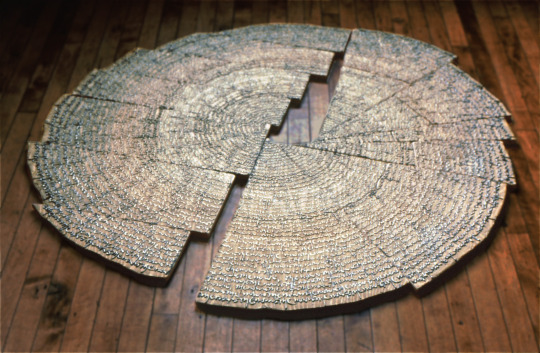
kariya hiroshi, “the” is now writing, Exit Art, 1981
#hiroshi kariya#kariya hiroshi#the is now#the now is#exit art#ica philadelphia#william j sozanski#ihara ludens gallery#hiro ihara#It’s all about the one piece and millions of others#moma ps1
1 note
·
View note
Photo


Andy Warhol stands in front of a limited edition serigraph of Princess Grace of Monaco to benefit the Institute of Contemporary Art in Philadelphia on June 1, 1984.
Photos by Scott Weiner
204 notes
·
View notes
Photo

Nathalie du Pasquier - Still Life on my Bicycle, 2005
17 notes
·
View notes
Photo

Speech/Acts
SEPTEMBER 13–DECEMBER 23, 2017
#ICA philadelphia#Speech/Acts#Martine Syms#Tiona Nekkia McClodden#Kameelah Janan Rasheed#Tony Lewis#Jibade-Khalil Huffman#Steffani Jemison#Fred Moten#Harryette Mullen#Morgan Parker#Simone White#Meg Onli
14 notes
·
View notes
Text
Mindfulness at the Museum with Hariprasad Kowtha Tickets, Fri, Mar 6, 2020 at 12:00 PM | Eventbrite
Mindfulness at the Museum with Hariprasad Kowtha Tickets, Fri, Mar 6, 2020 at 12:00 PM | Eventbrite

Hariprasad Kowtha
Eventbrite – Institute of Contemporary Art presents Mindfulness at the Museum with Hariprasad Kowtha – Friday, March 6, 2020 at Institute of Contemporary Art, Philadelphia, PA. Find event and ticket information.
RSVP: Mindfulness at the Museum with Hariprasad Kowtha Tickets, Fri, Mar 6, 2020 at 12:00 PM | Eventbrite
View On WordPress
#Hariprasad Kowtha#ICA#Institute of Contemporary Art#Meditation#Mindfulness#PA#Pennsylvania Events#Philadelphia Arts Classes#Philadelphia Classes#Things To Do In Philadelphia#United States Events#University City#West Philadelphia
0 notes
Text
Mindfulness at the Museum with Hariprasad Kowtha Tickets, Fri, Mar 6, 2020 at 12:00 PM | Eventbrite
New Post has been published on https://wiccadelphia.com/?p=1427
Mindfulness at the Museum with Hariprasad Kowtha Tickets, Fri, Mar 6, 2020 at 12:00 PM | Eventbrite


Hariprasad Kowtha
Eventbrite – Institute of Contemporary Art presents Mindfulness at the Museum with Hariprasad Kowtha – Friday, March 6, 2020 at Institute of Contemporary Art, Philadelphia, PA. Find event and ticket information.
RSVP: Mindfulness at the Museum with Hariprasad Kowtha Tickets, Fri, Mar 6, 2020 at 12:00 PM | Eventbrite
#Hariprasad Kowtha#ICA#Institute of Contemporary Art#Meditation#Mindfulness#PA#Pennsylvania Events#Philadelphia Arts Classes#Philadelphia Classes#Things To Do In Philadelphia#United States Events#University City#West Philadelphia
0 notes
Text
Sicily's Triumph of Death
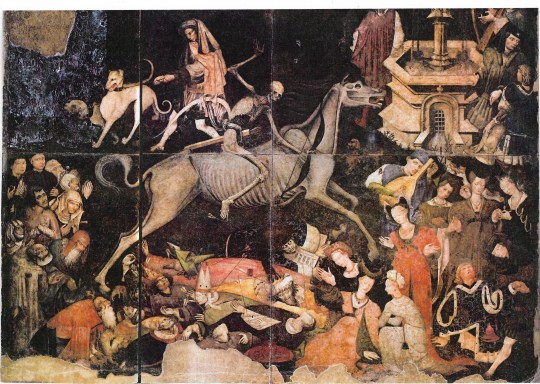
Triumph of Death – Palazzo Abatellis, Palermo
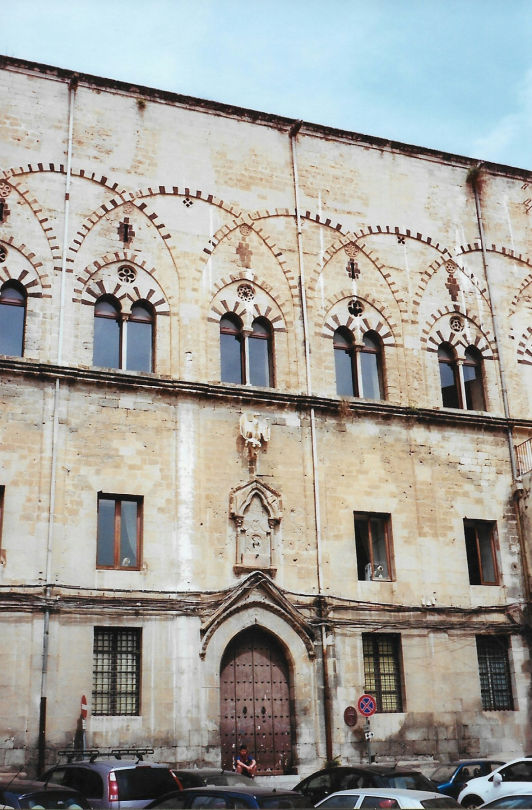
Palazzo Sclafani, Palermo
The Triumph of Death – il Trionfo della Morte – is a huge fresco filling most of the end wall of a large and lofty hall in Palazzo Abbatellis, the National Gallery of Sicily in Palermo. It was not painted for that room, but for a wall of the courtyard of another palazzo in the city, Palazzo Sclafani, still standing and still to be seen, though not visited, close to a public garden east of the Cathedral. That palazzo was built in 1330, originally for a Count, Matteo Sclafani, but exactly a hundred years later, in 1440, the City Administration (the Senate), wishing to rationalise its hospital provision and have one big hospital rather than seven small ones, requisitioned the palazzo, by then in a poor state, and set about converting it into the main hospital for the city. This development evidently included commissions for artists, and one of those was given to the painter of the Triumph. It is unfortunate that the commission document has never been found, but we can be thankful that aerial bombardment of Palazzo Sclafani in 1943 did not destroy, only damaged, the fresco, which was soon after removed, restored and displayed where it now is.

Details from Triumph of Death (clockwise from top): Death rides of a skeletal horse; The Fountain of Life; Death’s Victims; Lute Player
The painter’s choice of subject was a natural one for the courtyard of a hospital in those days. Sclafani’s palazzo dated from the time of the Black Death, but in Sicily, as in mainland Italy and the rest of Europe, Death in the form of plague had galloped back into people’s lives unpredictably and most often fatally ever since. Skeletal Death rides his skeletal horse full tilt across the fresco; his victims lie in a heap at the bottom of the picture. There is, however, Life, a Fountain of Life, beside which a harpist plays his silent music. Elegant ladies converse with animated gestures of shared alarm; there are men to the left, young and old, but, one observes, no children. Above the men a menacing wolfhound and another dog strain at the leash. Death, in short, threatens Life, for the mitred as for the unmitred, but Life is there. Memento Mori, you who enter this place and may not leave it alive; but remember, too, that you have lived, and life, with all its music and conversation, will continue after you.
Such is the general message. I have chosen this work as the focus of my latest Studies in Connoisseurship partly because we are living through a global pandemic. The hospitals of Palermo, as of many other cities in Italy and beyond, have once more been filled with very ill people dying, or threatened with dying, as life outside them struggles to continue.
As a connoisseur my motive is different. The fresco, unsurprisingly, has captivated many visitors and inspired some writers, but the fact that without a surviving contract or other document from the early 1440s we still do not know who painted this work surely plays its part in our fascination: we see it as a unique phenomenon, sui generis. This of course is unreal: someone painted it. Sicilians wonder if he was Sicilian. The last owner of Palazzo Sclafani lived in Spain; could he have proposed a Spanish artist? Some, bizarrely, have suggested that the painter may have come from the Netherlands. If he was Sicilian, did he afterwards leave the island to seek his fortune, like Antonello da Messina, on the mainland? Or did he come from the mainland, invited by the hospital’s rector, Pietro Speciale, or someone else who was commissioning works of art for it? A work like the Triumph of Death does not appear from nowhere; what other works by its creator preceded it?
I cannot answer these questions, but privately I have shared the quest for answers over many years, and I think I can at least contribute to our understanding of this anonymous artist by adding other works that may reasonably be attributed to him. As with all exercises in connoisseurship, what is ‘reasonable’ is what can be argued visually through juxtaposition of images.
First, a general observation should be made about the work from an aesthetic point of view. Iconographically, the Triumph of Death is well known and quite a lot has been written about antecedent examples of the theme, at the Campo Santo at Pisa, in the work of Orcagna, and elsewhere. In this case, however, the horse and the rider are not enough to pull the composition together, because all around them are disparate groups of figures and animals and objects that relate awkwardly to each other and fail to bond into a coherent whole. Whatever else he was, this artist cannot be said to be a great composer. Seen from a distance – as the fresco can be – it reminds one of some large and similarly incoherent tapestries. This is a serious defect which no doubt excludes it, as a whole, from the very highest rank of artistic achievement.

Details from Triumph of Death (clockwise from top left) – Death’s Horse; The King; a Survivor of Death; Death’s Victims
The words ‘as a whole’ are to be emphasised, though, because as soon as we draw close and our eyes take in the details (as would those of anyone standing or walking under the arcade of that hospital courtyard in 1442), they are everywhere amazed by what they discover in the sphere of draughtsmanship. There the artist excels, both in ‘disegno’, his brilliant invention of representational forms, and in the extraordinary refinement and elegance of his line, whether in the tail of the hound, the head of the horse (like something out of Guernica), in the aristocratic ladies or, most originally of all, in the heads of the dead tumbled together at the bottom. It is the quality of this artist’s drawing, rather than his colour or composition, that makes it less important that all the colour reproductions offered here are of questionable fidelity.
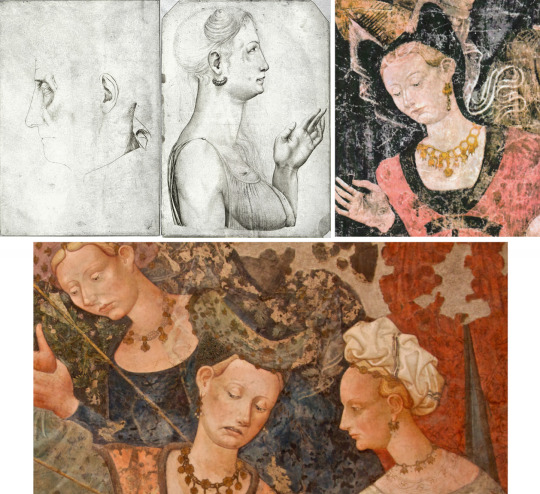
Comparing drawings at the Louvre (top left and top centre) with details of the noble women from Triumph of Death
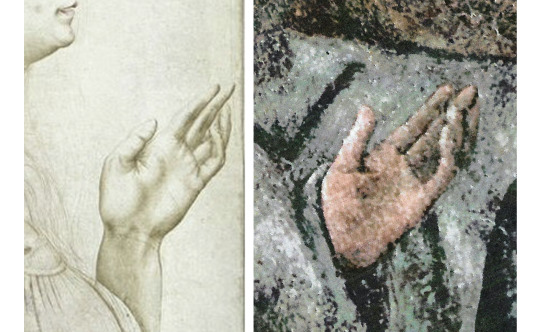
Comparing the similar hand gesture of the drawing of a Lady (left) and a Survivor of Death (right)
To pick out the draughtsmanship is, I believe, to pick up the key that can unlock the mystery of what else this artist did. Over many years of intermittent study I have kept a look-out for any drawings that might be associated with him by virtue of their extreme linear elegance combined with a certain oddity. Among the drawings in the Vallardi Album at the Louvre are a few that are not by Pisanello, and among these is a pair of profiles, one of a mature Lady, the other of an older Man. The one of the Lady is the more developed and the more remarkable, for the fine lines of the hair and the purity of contour in her profile. Compare this drawing with the depiction of the aristocratic ladies in the Trionfo, especially the one seen in profile who likewise wears an eardrop, and I think a definite similarity is observable. It is confirmed when we turn to the raised left hand of the Lady in the drawing. Artists describe hands and their gestures in such interestingly different ways: this one favours two fingers (first and second) straight, two fingers (third and fourth) bent. Anyone who tries to put their own fingers into the same position will soon realise that it is not natural and not sustainable; but there it is, not only in the drawing but in the Trionfo, exactly in one instance, and to varying degrees of bentness in many more. To anyone acquainted with the history of connoisseurship this could be a textbook illustration of Giovanni Morelli’s ‘method’.
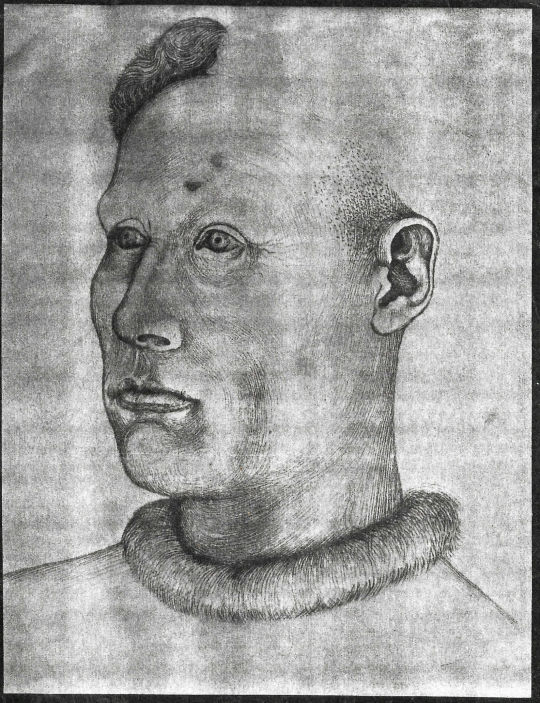
Drawing of a Man with a Fur Collar (Staatliche Graphische Sammlung München)

Comparing the Louvre Drawing (left) and Munich drawing (right) with faces from Triumph
At the Print Room at Munich (Staatliche Graphische Sammlung) there is another drawing, this time of a Man with a Fur Collar seen close-up, his head turned to our left, his neck emerging from a fur collar encircling it. this is not finished, but those fine lines drawn in long parallel strokes that distinguished the tresses of the Lady in the Vallardi Album are also here, along with a very particular shape given to the eye (upper lid and corner nearest to the nose) and to the ear, philtrum> and lips. These features are most clearly matched in the face of the young man on the extreme left of the Trionfo, and that of his companion.
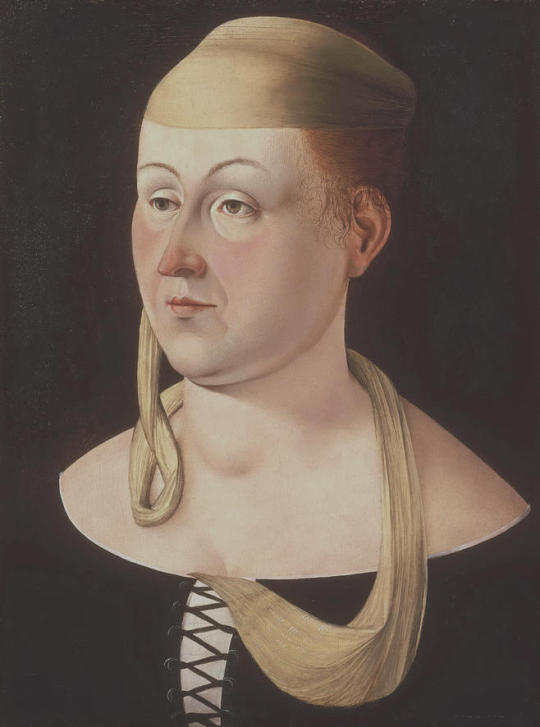
Portrait of a Lady – Johnson Collection, Philadelphia

Comparing the Drawings from the Louvre (Top Left and Bottom Right) and Munich (Bottom Left) with the Painting of the Lady at Washington
At this point in my quest for drawings by the Trionfo Master the trail goes cold. There is, however, a painting in the Johnson Collection at Philadelphia, attributed, unconvincingly in my view, to Ercole de Roberti, which exhibits exactly the eye-shape, ear-shape, lips and philtrum of the Munich drawing, as well as the sharp, rounded eyebrows of the Vallardi Lady and the ear of the Vallardi Man.The Johnson painting has morphological similarities with the Trionfo, but it seems to belong to a later period, and there is reason for thinking that it does. It may indeed be the link between the Trionfo and a whole body of much later work by this artist, not in Sicily but in Ferrara.

Comparing faces with fresco in Palazzo di Schifanoia of Virgo recumbant with her Decani (bottom panels)
In the Salone dei Mesi of the Palazzo di Schifanoia in Ferrara it is possible to distinguish fairly clearly the work of Francesco del Cossa, but there is another artist, credited with many of the Months whose identity has always puzzled art historians. He has been called the ‘Maestro di Ercole’ or the ‘Maestro degli Occhi Spalancati’, but these names have not led to much development of an oeuvre for an artist of such weird imagination and invention, a man capable, as Cossa was not, of creating extraordinary images like the figure of Virgo, for August, the giant lobster, for June, or the sign of Libra, for September.
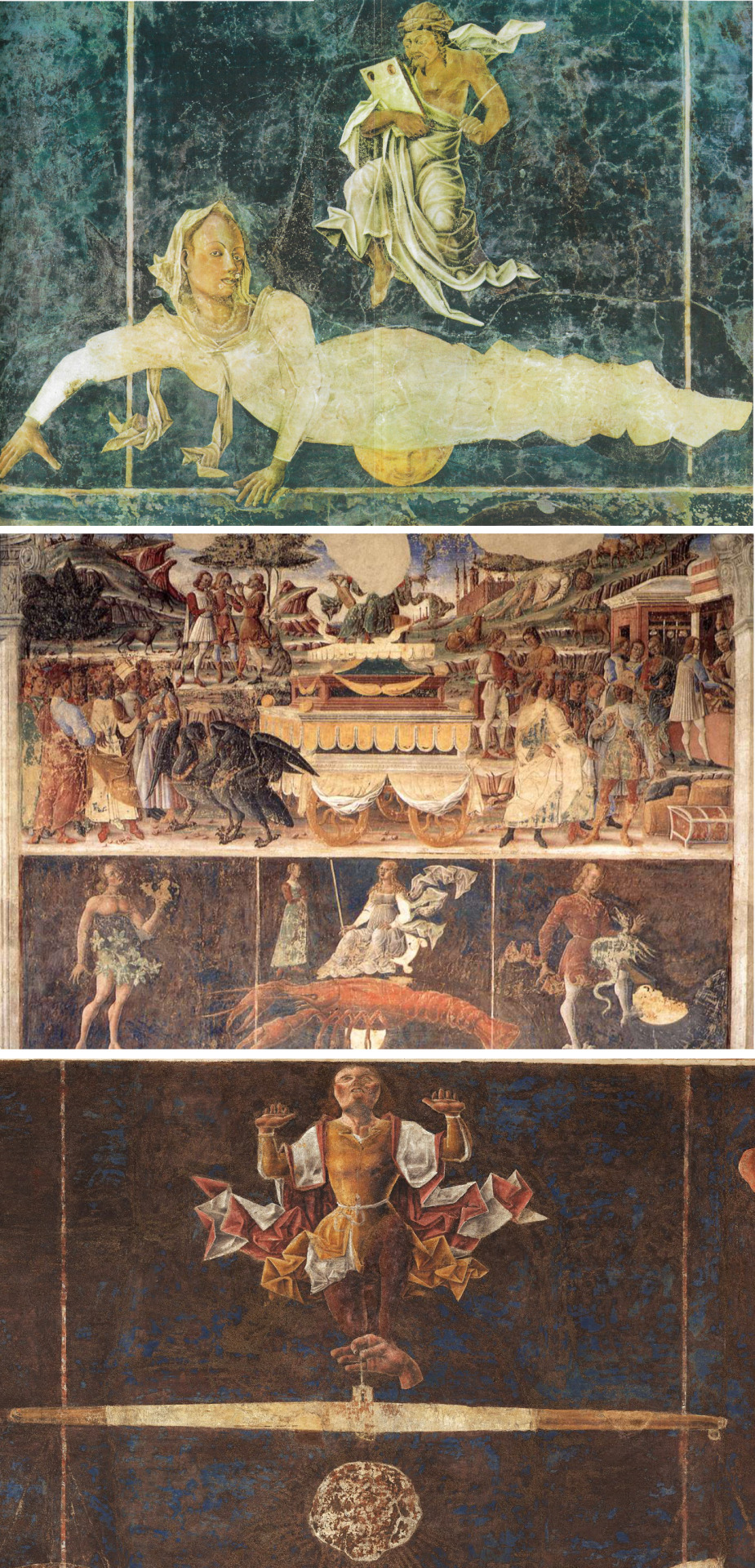
Scenes from the Fresco at Palazzo Schifanoia: Virgo in the Allegory of August (top); The Lobster from the Allegory of June (centre); Libra from the Allegory of September (bottom)
From Palazzo Sclafani to Palazzo Schifanoia is not only a leap of geography; there must also be a gap of many years, perhaps a quarter of a century. It is frustrating and unsatisfactory that there is, as yet, so little to fill that gap. I do believe, nevertheless, that Palermo and Ferrara are connected in the career of this painter. The argument depends as always on a juxtaposition such as this one: the Munich drawing, the Johnson portrait, the heads of Virgo.

Detail of Virgo (top left) to compare with the Lady in Philadelphia (top centre) and the Man in Munich (top right), and comparisons of the horse from Triumph of Death (bottom left) and horses from the Allegory of March (bottom right)
From August we can move to other Months in the astrological zodiac, and discover that the eccentricity manifest at Palermo has not deserted this artist, but it has changed. In the many years that have elapsed he has developed, for example, a bizarre way of representing drapery – like sharply creased paper folded one way and then another – and rocks – like laminated tombstones. Despite the lapse of years there is a horse’s head whose structure can still remind us of the one at Palermo.
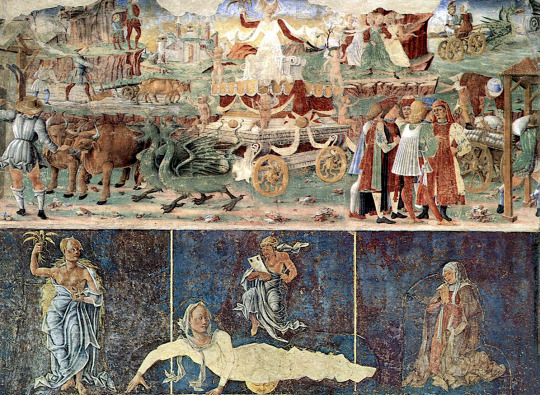
The Allegory of August, Triumph of Ceres and representation of Virgo – Palazzo Schifanoia

The Allegory of September (top) and detail of Mars in bed with a Nymph (bottom) – Palazzo Schifanoia
There is also a change of theme. The work at Palermo is dominated, very obviously, by Death, his work at Ferrara quite largely by Sex, especially so in August. The bare-breasted figure of Ceres brandishes the reaped corn and then, recumbent, sprawls luxuriously across three divisions while looking out seductively at the spectator. In September Mars is in bed with a nymph, Ylia, and the figure of Libra is set between two figures of a physique reminiscent of male ballet dancers, their calves developed like athletes on Greek pots. Sex, yes, but also, to complete the trinity, War. There is now a definite martial streak to the artist’s imagination, no doubt fuelled by the idea of ‘triumph’ and expressed in images of Mars, Vulcan’s Forge, armour.
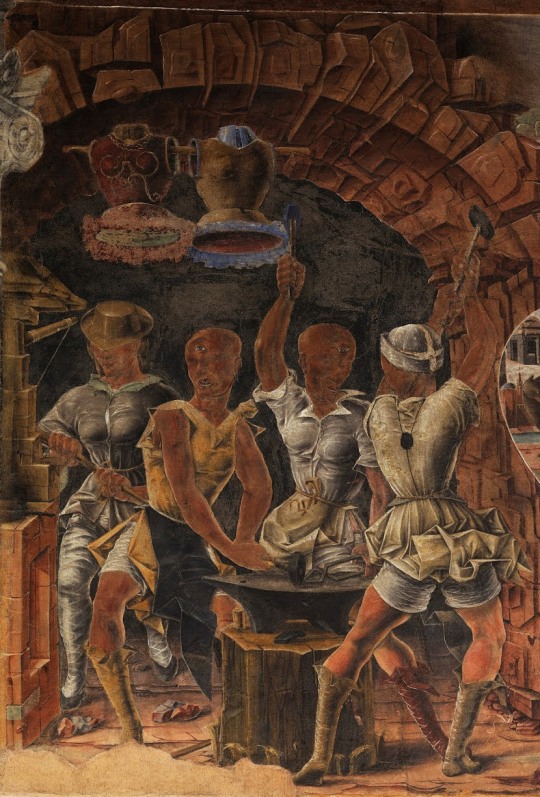
Detail of Vulcan’s Forge from The Allegory of September
His contributions to the Triumph scenes are at least as ill-composed as the Triumph at Palermo, but under them, in the Months, he wisely sets his figures and creatures against plain dark backdrops. We remember them all the better for their standing out pale, even white, against the deep blues and browns. At Palermo this had only begun to happen in the upper left quadrant and behind the horse.
Clearly I and others must look diligently for other works by this artist that will allow us to see how he developed between the two periods of activity and what he was doing before the first one. The drawings that I have proposed as his must belong to the earlier, Palermitan phase of his career, but how did he draw in later years? His name is more likely to be discovered by historians and archivists. I would like him to be a Sicilian – the island has too few major artists besides Antonello da Messina – but I must declare a doubt that he was. We need the evidence in any case to tell us whether he was brought to Palermo from the mainland or was native to the island at the time of the Sclafani commission. Without the facts we are left in ignorance. If the thesis presented here, of a connection between Palermo and Ferrara, should find acceptance, I hope that it will have armed us with a little more understanding of his character as an artist. He has an abundance of character. As painter, as draughtsman, as inventor of images, he appears to be one of the great eccentrics of European art, and one that can speak to us, of life and death and love, in another dark time.

#triumph of death#sicily#italian art#palazzo schifanoia#palazzo sclafani#palermo#studies in connoisseurship#connoisseurship#art history#art secrets
56 notes
·
View notes
Photo

Burn the Diaries, 2014, published by Dancing Foxes/MuMok/ICA Philadelphia.
44 notes
·
View notes
Text

Hiroshi Kariya,
OSDLM2018, B3 Flipped, Mixed Media, In progress thru 2019
#hiroshi kariya#seed sutra#mizuma art gallery#armoryshow#face sutra#hiroshikariya#sign of the times#art tower mito#ica philadelphia#exit art
8 notes
·
View notes
Photo

Robert Morris, Untitled (Labyrinth), ICA Philadelphia, 1974
#robert morris#labyrinth#art#sculpture#ica philadelphia#installation#exhibition#minimalism#grupa o.k.
427 notes
·
View notes